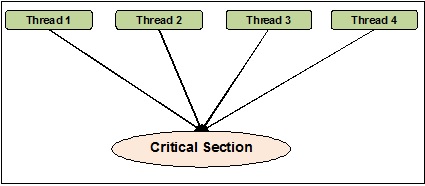- C#线程同步
- C#线程同步(1)
- Java的锁框架与线程同步(1)
- Java的锁框架与线程同步
- Java同步-线程中断
- Java同步-线程中断(1)
- C#|检查数组是否同步(线程安全)(1)
- C#|检查数组是否同步(线程安全)
- 使用线程同步顺序打印数字
- 使用线程同步顺序打印数字(1)
- 使用线程同步顺序打印数字(1)
- 使用线程同步顺序打印数字
- Java同步-同步块示例
- Linux 线程同步的互斥锁
- Linux 线程同步的互斥锁(1)
- c# 新线程 - C# (1)
- c++ 线程 - C++ (1)
- 线程 (1)
- C#中的线程类
- 线程组 c++ (1)
- C#中的线程类(1)
- C#线程类(1)
- 线程 c# (1)
- C#线程类
- C#|检查ArrayList是否已同步(线程安全)
- C#|检查ArrayList是否已同步(线程安全)(1)
- Java中的同步
- 同步java(1)
- Java中的同步(1)
📅 最后修改于: 2020-11-08 08:44:26 🧑 作者: Mango
可以将线程同步定义为一种方法,借助该方法,我们可以确保两个或多个并发线程不会同时访问被称为关键节的程序段。另一方面,我们知道关键部分是程序中访问共享资源的部分。因此,我们可以说同步是通过同时访问资源来确保两个或更多线程不相互接口的过程。下图显示了四个线程试图同时访问程序的关键部分。

为了更加清楚,假设有两个或更多线程试图同时在列表中添加对象。此操作无法导致成功结束,因为它会丢弃一个或所有对象,或者将完全破坏列表的状态。同步的作用是一次只能有一个线程访问该列表。
线程同步中的问题
在实现并发编程或应用同步原语时,我们可能会遇到问题。在本节中,我们将讨论两个主要问题。问题是-
- 僵局
- 比赛条件
比赛条件
这是并发编程中的主要问题之一。并发访问共享资源可能导致争用情况。竞争条件可以定义为当两个或多个线程可以访问共享数据然后尝试同时更改其值时发生的条件。因此,变量的值可能是不可预测的,并且取决于过程的上下文切换的时间而变化。
例
考虑这个例子以了解竞争条件的概念-
步骤1-在此步骤中,我们需要导入线程模块-
import threading
步骤2-现在,定义一个全局变量,例如x,并将其值设置为0-
x = 0
步骤3-现在,我们需要定义cremental_global()函数,它将在此全局函数x中进行1的增量-
def increment_global():
global x
x += 1
步骤4-在这一步中,我们将定义taskofThread()函数,该函数将调用increment_global()函数指定的次数;在我们的例子中是50000次-
def taskofThread():
for _ in range(50000):
increment_global()
步骤5-现在,定义main()函数,在其中创建线程t1和t2。两者都将在start()函数的帮助下启动,并等到它们在join()函数的帮助下完成工作。
def main():
global x
x = 0
t1 = threading.Thread(target= taskofThread)
t2 = threading.Thread(target= taskofThread)
t1.start()
t2.start()
t1.join()
t2.join()
步骤6-现在,我们需要给出要调用main()函数的迭代次数的范围。在这里,我们称之为5次。
if __name__ == "__main__":
for i in range(5):
main()
print("x = {1} after Iteration {0}".format(i,x))
在下面显示的输出中,我们可以看到竞争条件的影响,因为每次迭代后x的值预计为100000。但是,该值存在很多差异。这是由于线程对共享全局变量x的并发访问。
输出
x = 100000 after Iteration 0
x = 54034 after Iteration 1
x = 80230 after Iteration 2
x = 93602 after Iteration 3
x = 93289 after Iteration 4
使用锁处理比赛条件
正如我们在上面的程序中看到竞争条件的影响一样,我们需要一个同步工具,该工具可以处理多个线程之间的竞争条件。在Python,
Acquisition()方法
此方法用于获取(即阻止锁)。锁可以是阻塞的还是非阻塞的,具体取决于以下true或false值-
-
值设置为True -如果默认参数True调用了acquire()方法,则线程执行将被阻塞,直到锁被解锁。
-
值设置为False -如果使用False(不是默认参数)调用acquire()方法,则直到将其设置为true(即锁定),线程才会被阻塞。
release()方法
此方法用于释放锁。以下是与此方法有关的一些重要任务-
-
如果锁被锁定,则release()方法将其解锁。它的工作是如果一个以上的线程被阻塞并等待锁被解锁,则只允许一个线程继续运行。
-
如果锁已经解锁,它将引发ThreadError 。
现在,我们可以使用lock类及其方法重写上述程序,以避免出现竞争情况。我们需要使用lock参数定义taskofThread()方法,然后需要使用acquire()和release()方法来阻塞和不阻塞锁,以避免出现竞争情况。
例
以下是Python程序的示例,以了解用于处理竞争条件的锁的概念-
import threading
x = 0
def increment_global():
global x
x += 1
def taskofThread(lock):
for _ in range(50000):
lock.acquire()
increment_global()
lock.release()
def main():
global x
x = 0
lock = threading.Lock()
t1 = threading.Thread(target = taskofThread, args = (lock,))
t2 = threading.Thread(target = taskofThread, args = (lock,))
t1.start()
t2.start()
t1.join()
t2.join()
if __name__ == "__main__":
for i in range(5):
main()
print("x = {1} after Iteration {0}".format(i,x))
以下输出显示了竞争条件的影响被忽略;因为每次迭代后x的值现在都是100000,这符合该程序的期望。
输出
x = 100000 after Iteration 0
x = 100000 after Iteration 1
x = 100000 after Iteration 2
x = 100000 after Iteration 3
x = 100000 after Iteration 4
僵局-餐饮哲学家的问题
死锁是设计并发系统时可能面临的一个麻烦问题。我们可以借助餐饮哲学家问题来说明这个问题,如下所示:
Edsger Dijkstra最初介绍了餐饮哲学家问题,这是并发系统最大问题之一(死锁)的著名例证之一。
在这个问题上,有五个著名的哲学家坐在圆桌旁,从碗里吃些食物。五位哲学家可以用五把叉子来吃饭。但是,哲学家决定同时使用两个叉子来吃食物。
现在,哲学家有两个主要条件。首先,每个哲学家要么处于饮食状态,要么处于思想状态,其次,他们必须首先获得两个叉子,即左,右。当五个哲学家中的每一个都设法同时拾起左叉时,就会出现问题。现在,他们都在等待免费的叉子,但是他们直到吃完饭就永远不会放弃叉子,并且永远不会有合适的叉子。因此,餐桌上将出现死锁状态。
并发系统中的死锁
现在,如果我们看到了,在我们的并发系统中也会出现相同的问题。上例中的分叉将是系统资源,每个哲学家都可以代表该过程,而该过程正在争夺资源。
Python程序解决方案
解决这个问题的方法是将哲学家分为两种:贪婪的哲学家和慷慨的哲学家。主要是一个贪婪的哲学家会尝试拿起左叉,等到它在那里。然后,他将等待正确的叉子在那里,拿起它,吃然后放下来。另一方面,一个慷慨的哲学家将尝试拿起左叉,如果不存在,他将等待一段时间后再尝试。如果他们得到左叉,那么他们将尝试得到正确的叉。如果他们也得到正确的叉子,那么他们将吃掉并放开两个叉子。但是,如果他们没有得到右叉,那么他们将释放左叉。
例
以下Python程序将帮助我们找到餐饮哲学家问题的解决方案-
import threading
import random
import time
class DiningPhilosopher(threading.Thread):
running = True
def __init__(self, xname, Leftfork, Rightfork):
threading.Thread.__init__(self)
self.name = xname
self.Leftfork = Leftfork
self.Rightfork = Rightfork
def run(self):
while(self.running):
time.sleep( random.uniform(3,13))
print ('%s is hungry.' % self.name)
self.dine()
def dine(self):
fork1, fork2 = self.Leftfork, self.Rightfork
while self.running:
fork1.acquire(True)
locked = fork2.acquire(False)
if locked: break
fork1.release()
print ('%s swaps forks' % self.name)
fork1, fork2 = fork2, fork1
else:
return
self.dining()
fork2.release()
fork1.release()
def dining(self):
print ('%s starts eating '% self.name)
time.sleep(random.uniform(1,10))
print ('%s finishes eating and now thinking.' % self.name)
def Dining_Philosophers():
forks = [threading.Lock() for n in range(5)]
philosopherNames = ('1st','2nd','3rd','4th', '5th')
philosophers= [DiningPhilosopher(philosopherNames[i], forks[i%5], forks[(i+1)%5]) \
for i in range(5)]
random.seed()
DiningPhilosopher.running = True
for p in philosophers: p.start()
time.sleep(30)
DiningPhilosopher.running = False
print (" It is finishing.")
Dining_Philosophers()
上面的程序使用贪婪和慷慨的哲学家的概念。该程序还使用了
输出
4th is hungry.
4th starts eating
1st is hungry.
1st starts eating
2nd is hungry.
5th is hungry.
3rd is hungry.
1st finishes eating and now thinking.3rd swaps forks
2nd starts eating
4th finishes eating and now thinking.
3rd swaps forks5th starts eating
5th finishes eating and now thinking.
4th is hungry.
4th starts eating
2nd finishes eating and now thinking.
3rd swaps forks
1st is hungry.
1st starts eating
4th finishes eating and now thinking.
3rd starts eating
5th is hungry.
5th swaps forks
1st finishes eating and now thinking.
5th starts eating
2nd is hungry.
2nd swaps forks
4th is hungry.
5th finishes eating and now thinking.
3rd finishes eating and now thinking.
2nd starts eating 4th starts eating
It is finishing.